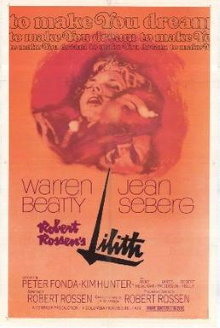Director Robert Rossen is best known for the great classic The Hustler and I noted then the surprisingly complex psychologies of each character in it. Here’s another film of his that is even more explicitly psychological, set as it is in an upscale asylum. Unfortunately I like this less as it quickly falls into a familiar pattern and I would prefer it if the characters acted less mysteriously. But it is a well executed film and the presence of Jean Seberg even lends it a bit of an European air.
Vincent Bruce is a veteran of the Second World War who returns to his home town as a civilian. He interviews at a private mental institution as a trainee therapist and is quickly offered a job. Being more of a listener than a talker, he comes across as being calm and caring and win overs both staff and patients. He is also successful in connecting with a patient Lilith Arthur who is very beautiful but is known for secluding herself from the world. Though Vincent attempts to maintain professional distance and faithfully reports his interactions with Lilith to his superiors, her physical beauty and blatant attempts to seduce him eventually succeed. Even as he realizes that she compulsively makes others desire her and then hurt them, he falls in love with her anyway. His obsession with her grows until it compromises his own mental health and he resents sharing her affections with anyone else.
The serene setting of this very well-appointed and expensive institution presages the character of the patients who reside there. Though a couple are more blatantly crazy, a woman who laughs too much for example, most of them are erudite and so well-mannered that their particular brand of insanity only emerges over the course of a long conversation. Lilith herself seems normal enough at first glance and her charm is obvious for all to see. Yet even as Vincent watches on, a seemingly innocuous interaction between her and two little boys turns sensual as she teases them. The revelation that Vincent himself is not well is similarly subtle. What at first comes across like a taciturn personality hints later of a psyche damaged by war trauma as well as an attachment to his deceased mother who was herself of questionable sanity. I do like the slow ramping up of the psychological distress in this film but I feel that it disappoints at the climax which side-steps conflict and confrontation rather than having it played out explicitly. It would also have been more satisfying if some personal details necessary to character developed appeared on-camera, an anecdote of what Vincent’s mother was like for example, instead of just being alluded to obliquely, or some reference to what Vincent actually experienced in the war.
This film was adapted from a novel by J.R. Salamanca and while I haven’t read the book, I do know that it was written in the first person from the perspective of Vincent. Such an introspective character certainly sounds very different from this film version who rarely voices his own opinion! With him being so silent, I don’t quite understand what the director was going for with the character of Vincent’s ex-girlfriend for example. It also seems puzzling to me that Lilith is introduced as a quiet person who keeps to herself but she never behaves that way in any of her scenes. There are some hints here of her inhabiting a private, fantasy world with her own invented language but mostly it’s about her being manipulative. The scene in here of Vincent participating in a jousting tournament as if he were a knight is one example of how the fantastical the novel gets and there is apparently much more of it there. It’s just interesting to note different these two versions are and to try to understand the film a little better by referring to its source material.
Unfortunately neither this film nor the novel are considered truly great. The book was well received upon release but now seems to be considered a weak copy of Lolita. As for the film, it’s a solid credit to Rossen’s career but is considered very different from the rest of his work. This was also the last film he ever made as apparently he had too much conflict with Warren Beatty over the characterization of Vincent here.
